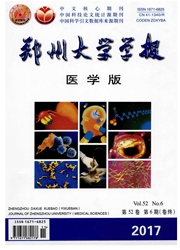

 中文摘要:
中文摘要:
目的:研究热化疗对人小细胞肺癌H446细胞增殖的影响及其可能机制。方法:H446细胞分为单纯化疗组(单纯使用120μg/L紫杉醇处理细胞)、热化联合组(采用43℃加热联合120μg/L紫杉醇处理细胞)、抑制剂组(采用43℃加热联合120μg/L紫杉醇及1μmol/LAkt特异抑制剂wortmannin处理细胞),以未处理的H446细胞作对照。应用MTT法检测各组细胞增殖率的变化,采用WesternBlot检测各组细胞磷酸化Akt水平。结果:对照组、单纯化疗组、热化联合组和抑制剂组细胞增殖率分别为(100.00±0.00)%、(69.16±2.95)%,(59.83±3.36)%和(40.65±0.14)%,磷酸化AKt水平分别为(1.52±0.01),(1.04±0.42),(0.69±0.03)和(0.00±0.00),4组细胞增殖率及磷酸化Akt水平相比,差异均有统计学意义(F=68.231和6.232,P均〈0.05)。与对照组和单纯化疗组相比,热化联合组细胞增殖率及磷酸化Akt水平均降低(P〈0.05),wortmannin可进一步抑制H446细胞的磷酸化,且降低细胞的增殖率(P〈0.05)。结论:热化疗联合应用可抑制H446细胞增殖,其作用可能是通过抑制Akt信号转导通路实现的。
 英文摘要:
英文摘要:
Aim:To study the effect of thermo-chemotherapy on the proliferation of lung cancer H446 cells and its possible mechanism.Methods:H446 cells were allocated into 4 groups:cells in chemotherapy group were given 120 μg/L paclitaxel,those in thermo-chemotherapy group were treated by paclitaxel and heating at 43 ℃,those in inhibitor group were treated by Akt inhibitor,wortmannin,besides the treatment as thermo-chemotherapy group.The cells untreated served as control. MTT assay was used to measure cell proliferation,and Western Blot was used to examine the phosphorylation level of Akt.Results:The cell proliferation rates of the 4 groups were (100.00±0.00)%,(69.16±2.95)%,(59.83±3.36)%,and (40.65±0.14)%,and the phosphorylation level of Akt of the 4 groups were (1.52±0.01),(1.04±0.42),(0.69±0.03),and (0.00±0.00),and there were significant differences(F=68.231 and 6.232,P0.05). Compared with control group and chemotherapy group,the cell proliferation rate and the phosphorylation level of Akt in the thermo-chemotherapy group were decreased(P0.05),and wortmannin could further inhibit the phosphorylation of Akt and the proliferation rate(P0.05).Conclusion:Thermo-chemotherapy can inhibit the proliferation of H446 cells,which may be realized by inhibiting Akt pathway.
 同期刊论文项目
同期刊论文项目
 同项目期刊论文
同项目期刊论文
 期刊信息
期刊信息
